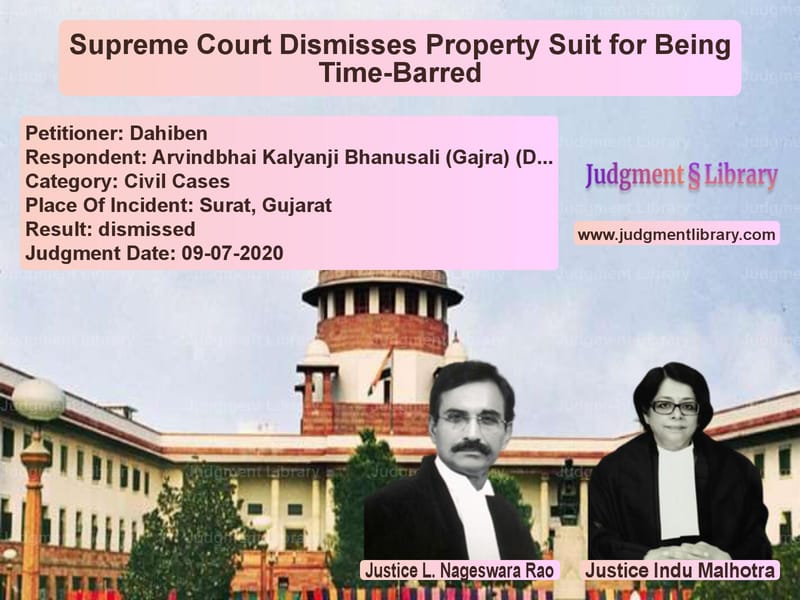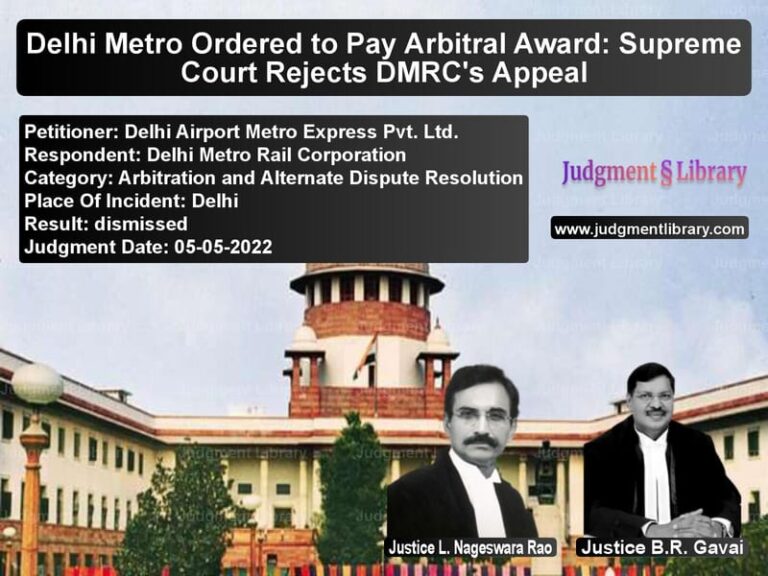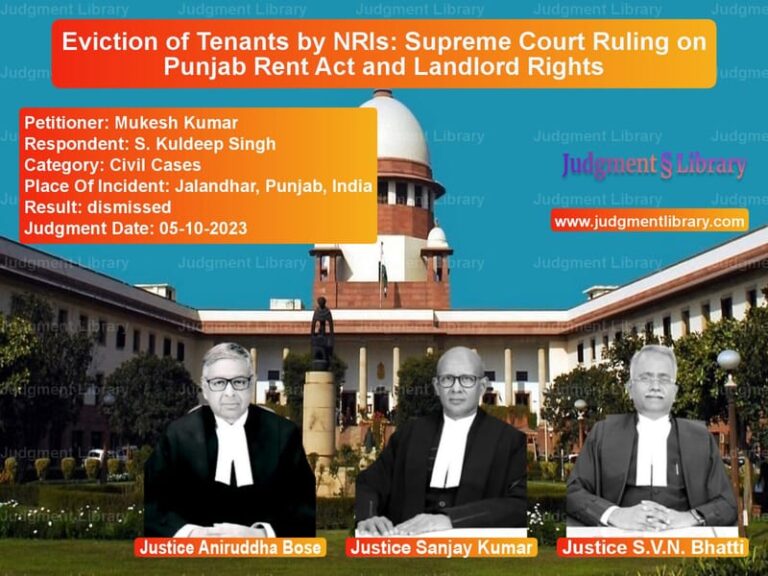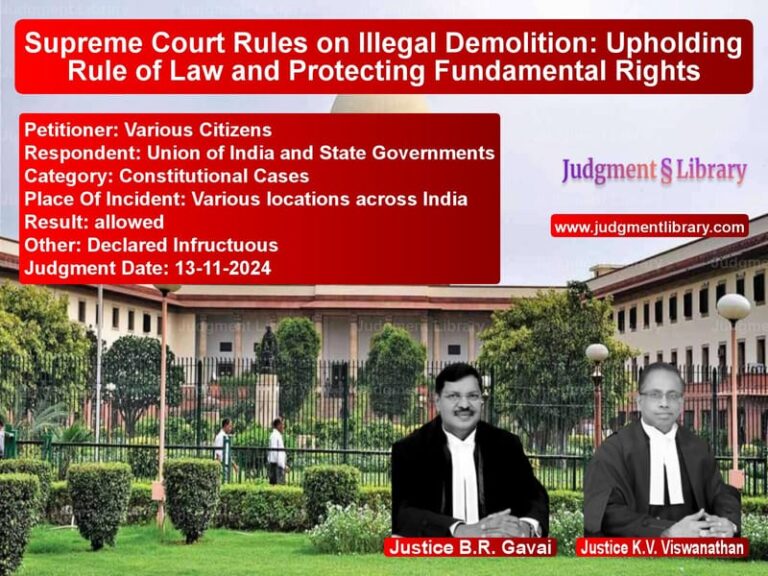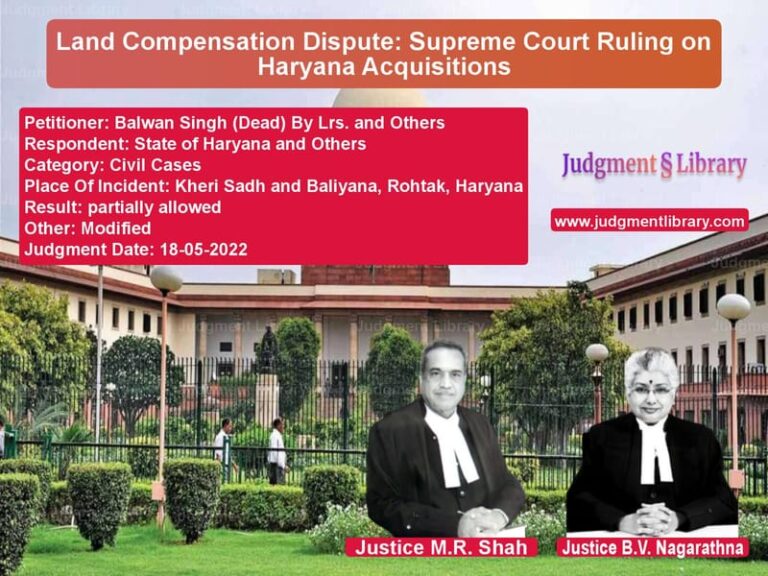Supreme Court Dismisses Property Suit for Being Time-Barred
The Supreme Court of India, in the case of Dahiben vs. Arvindbhai Kalyanji Bhanusali (Gajra) (D) Thr LRS & Ors., ruled that the appellant’s suit for cancellation of a sale deed was barred by limitation. The judgment reinforced the legal principle that a plaintiff cannot revive a time-barred claim by making an illusory plea of fraud. The Court upheld the dismissal of the suit under Order VII Rule 11(d) of the Code of Civil Procedure (CPC) as the suit was filed beyond the limitation period.
The case involved the sale of agricultural land in Gujarat. The plaintiffs executed a registered sale deed in favor of the defendant on July 2, 2009, acknowledging full payment. However, after more than five years, they filed a suit in 2014, claiming that the cheques mentioned in the sale deed were bogus and that they had not received the full sale consideration. The trial court dismissed the suit as time-barred, a decision upheld by the Gujarat High Court and later affirmed by the Supreme Court.
Background of the Case
The dispute pertained to agricultural land measuring 8701 square meters in Mota Varachha, Surat. The plaintiffs, who were the original owners, sought permission from the Collector to sell the land, which was granted on June 19, 2009, at a fixed price of Rs. 1,74,02,000. Subsequently, a registered sale deed was executed on July 2, 2009, with the plaintiffs acknowledging full payment through 36 cheques.
On December 15, 2014, the plaintiffs filed a suit seeking cancellation of the sale deed, claiming that 30 cheques were never encashed. The trial court rejected the suit under Order VII Rule 11(d) CPC, holding that it was barred by limitation. The High Court affirmed this decision, leading to the present appeal before the Supreme Court.
Arguments of the Petitioner
The appellant’s counsel contended:
- The plaintiffs were illiterate and were unaware that the full sale consideration had not been paid.
- The fraud committed by the defendants came to light only in 2014 when they obtained copies of the sale deed.
- Since fraud vitiates all transactions, the limitation period should begin from the date of discovery of fraud.
- The defendants should not be allowed to retain the land without making full payment.
Arguments of the Respondent
The respondents countered:
- The plaintiffs had knowingly executed a registered sale deed, acknowledging full payment.
- The plaintiffs failed to raise any objection for over five years despite having access to bank records.
- The suit was filed only after the property was resold in 2013, which indicated malafide intent.
- The trial court and the High Court correctly held that the suit was barred by limitation under Article 59 of the Limitation Act.
Supreme Court’s Key Findings
1. Bar of Limitation
The Supreme Court held that the limitation period for cancellation of a sale deed under Article 59 of the Limitation Act is three years from the date of execution. Since the sale deed was executed on July 2, 2009, the suit should have been filed by July 2, 2012. The Court observed:
“A suit seeking cancellation of a sale deed must be filed within three years from the date of execution, unless fraud is pleaded with specific evidence.”
2. Lack of Evidence to Prove Fraud
The Court found that the plaintiffs failed to provide any documentary proof that the cheques were not encashed. The Court ruled:
“A mere allegation of fraud, without any supporting evidence, cannot be a ground to extend the limitation period.”
3. Registered Sale Deed is Binding
The Court emphasized that a registered sale deed carries a presumption of validity. The plaintiffs’ acknowledgment of full payment in the sale deed was binding on them. The ruling stated:
“A party cannot challenge a registered document after several years merely by claiming ignorance of its contents.”
4. Plaintiffs’ Conduct Raised Doubts
The plaintiffs remained silent for over five years and filed the suit only after the land was resold. The Court found this conduct suspicious and indicative of an attempt to harass the bona fide purchasers. The Court noted:
“Deliberate delay in raising objections suggests an attempt to misuse legal provisions for undue gains.”
Final Judgment
The Supreme Court:
- Dismissed the appeal.
- Affirmed the High Court’s ruling that the suit was barred by limitation.
- Imposed costs of Rs. 1,00,000 on the appellant, payable to the respondents within 12 weeks.
Key Takeaways from the Judgment
- A registered sale deed, once executed, is presumed to be valid and binding.
- Fraud must be specifically pleaded and proven; a mere claim is insufficient to extend the limitation period.
- Legal claims must be filed within the statutory limitation period, or they will be dismissed.
- Deliberate delay in initiating legal action can lead to adverse inferences against the plaintiff.
Conclusion
The Supreme Court’s ruling in this case sets a crucial precedent on property disputes and limitation laws. It reaffirms that courts will not entertain stale claims and that plaintiffs must act promptly to protect their rights. This decision safeguards bona fide purchasers and ensures stability in property transactions.
Petitioner Name: Dahiben.Respondent Name: Arvindbhai Kalyanji Bhanusali (Gajra) (D) Thr LRS & Ors..Judgment By: Justice L. Nageswara Rao, Justice Indu Malhotra.Place Of Incident: Surat, Gujarat.Judgment Date: 09-07-2020.
Don’t miss out on the full details! Download the complete judgment in PDF format below and gain valuable insights instantly!
Download Judgment: Dahiben vs Arvindbhai Kalyanji Supreme Court of India Judgment Dated 09-07-2020.pdf
Direct Downlaod Judgment: Direct downlaod this Judgment
See all petitions in Property Disputes
See all petitions in Contract Disputes
See all petitions in Succession and Wills
See all petitions in Judgment by L. Nageswara Rao
See all petitions in Judgment by Indu Malhotra
See all petitions in dismissed
See all petitions in supreme court of India judgments July 2020
See all petitions in 2020 judgments
See all posts in Civil Cases Category
See all allowed petitions in Civil Cases Category
See all Dismissed petitions in Civil Cases Category
See all partially allowed petitions in Civil Cases Category

